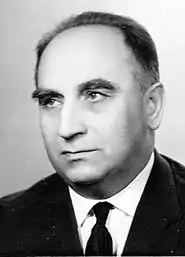Stefan Jędrychowski
Stefan Jędrychowski (19 May 1910 – 26 May 1996) was a Polish communist politician and journalist, who served as deputy prime minister, foreign minister and finance minister in Poland.
Stefan Jędrychowski | |
|---|---|
 | |
| Minister of Finance of Poland | |
| In office 22 December 1971 – 21 November 1974 | |
| Preceded by | Józef Trendota |
| Succeeded by | Henryk Kisiel |
| Minister of Foreign Affairs | |
| In office 22 December 1968 – 22 December 1971 | |
| Preceded by | Adam Rapacki |
| Succeeded by | Stefan Olszowski |
| Deputy Prime Minister | |
| In office 12 December 1951 – 24 October 1956 | |
| Preceded by | Hipolit Chelchowski |
| Succeeded by | Tadeusz Gade |
| Personal details | |
| Born | 19 May 1910 Warsaw, Congress Poland, Russian Empire |
| Died | 26 May 1996 (aged 86) Warsaw, Poland |
| Nationality | Polish |
| Political party | Soviet Communist Party Polish United Workers' Party |
| Alma mater | Stefan Batory University |
Early life and education
Born in Warsaw on 19 May 1910,[1][2] Jędrychowski hailed from a middle-class Catholic family, who owned properties and apartment houses in Wilno, then in the Russian part of Poland.[3][4] His mother was of German origin.[3]
He studied law and social science at Stefan Batory University in Wilno, graduating in 1932.[3] Then he obtained a master's degree in law from the same university.[4] He also received a PhD in economics.[4][5] He began his political career as a radical leftist Catholic in the group called "Odrodzenie" (renaissance) when he was an undergraduate student.[6] Then he switched to a youth organization "Legion Mlodych" (The Legion of Youth) that was founded by Józef Piłsudski after he took over the Polish government in 1926.[3] Jędrychowski became a member of the group's regional command.[3]
Career and activities
Jędrychowski began his career as an assistant lecturer in economics at Stefan Batory University.[4] In 1936, he joined the Communist Party.[4] In September 1939, he began to work as a journalist in Wilno.[4][6] Then he was named deputy editor of the local communist daily which had been published by the Soviet authorities.[4] He became a Soviet citizen and a member of the Soviet Communist Party.[4] Following the annexation of Lithuania to the Soviet Union he served at the Supreme Soviet as a deputy.[4]
Later he continued his activities in the Polish committee of national liberation’ (PKWN), which was formed on 22 July 1944.[7] Shortly after he began to serve as the PKWN's representative in Moscow.[7] He was also the Warsaw government’s delegate in France in 1945.[5] In addition, he headed the department of information and propaganda under the PKWN.[8] From 1945 to 1947 he served as minister of navigation and foreign trade in the national unity government.[4] Next he joined the Polish United Workers' party.[9] And he became an alternate member of the party's central committee or politburo.[10]
He served as the vice president or deputy prime minister at the Polish cabinet, also known as Rada Ministrów, from 12 December 1951 to 24 October 1956.[11][12] He worked as the head of the planning office, Komisja Planowania, from 1956 to 1971.[13][14] He was also promoted to the full membership of the party's central committee on 21 October 1956, being one of nine members.[10][15] At the committee he assumed the post of chief economic advisor.[16] He served as the minister of foreign affairs from 22 December 1968 to 22 December 1971.[11] In December 1971, his membership at the central committee of the party ended.[14][17] Next he was named minister of finance on 22 December 1971, and his term ended on 21 November 1974.[12][18]
References
- Radio Free Europe Research: East Europe. Situation report. Poland. Radio Free Europe. 1971.
- "Biuletyn Informacji Publicznej Instytutu Pamięci Narodowej". katalog.bip.ipn.gov.pl.
- "The Communist Leadership". Open Society Archives. 14 May 1950. Retrieved 14 July 2013.
- Oscar Halecki (1957). Poland. New York: Frederick A. Praeger. – via Questia (subscription required)
- "Solidarity Between Jews and Poles Stressed by Warsaw Govt. Envoy at Paris Meeting". JTA Archive. 18 February 1945. Retrieved 14 July 2013.
- "People in the Polish committee of liberation". Catholic Herald. 4 August 1944. Retrieved 14 July 2013.
- Jacek Tebinka. "Policy of The Soviet Union towards The Warsaw Uprising 1 August – 2 October 1944". London Branch of the Polish Home Army Ex-Servicemen Association.
- "Soviet Puppet Government in Poland". Polish Information Center 1939-1945. Retrieved 14 July 2013.
- Anne Applebaum (22 November 2012). "How the Communists Inexorably Changed Life". The New York Review of Books. Retrieved 14 July 2013.
- Tadeusz N. Cieplak (1 January 1972). Poland Since 1956. Ardent Media. p. 9. GGKEY:05P4FRN9EUP.
- "Polish Ministries". Rulers. Retrieved 14 July 2013.
- "Overview of the Stefan Jędrychowski papers". Online Archive of California. Retrieved 14 July 2013.
- Samuel L. Sharp (1953). Poland White Eagle on a Red Field. Harvard University Press.
- "Jan Svoboda's Notes on the CPSU CC Presidium Meeting with Satellite Leaders, 24 October 1956" (PDF). The George Washington University. Retrieved 14 July 2013.
- L. W. Gluchowski (Spring 1995). "Poland, 1956" (PDF). Wilson Bulletin (5).
- Wlodzimierz Rozenbaum (1997). "The Anti-Zionist Campaign in Poland, June - December 1967". Intermarium. 1 (3).
- "Polish Communists Get Younger Men". The Sun. Warsaw. Reuters. 14 December 1971. Retrieved 14 July 2013.
- "Ministrowie finansów - Ministerstwo Finansów - Portal Gov.pl".
- "Jędrychowski Stefan | Blisko Polski".